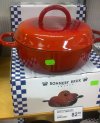Here's a reminder of what Cayce said about aluminium:
843-7(16)
Also, regularly he advice to not cook with aluminum containers but enamel or glass. However I don't think we have a lot of aluminum containers today.
843-7(16)
[...]the effect of aluminum - or effect upon the body by foods being cooked in same - adds to rather than detracts from the activities in the system.
Hence, as we have indicated for many who are affected by nervous digestion or an overactivity of the nerve forces during the state of digestion taking place, the body should be warned about using or having foods cooked in aluminum. For this naturally produces a hardship upon the activities of the kidneys as related to the lower hepatic circulation, or the uric acid that is a part of the activity of the kidneys in eliminating same from the system.
Also, regularly he advice to not cook with aluminum containers but enamel or glass. However I don't think we have a lot of aluminum containers today.

